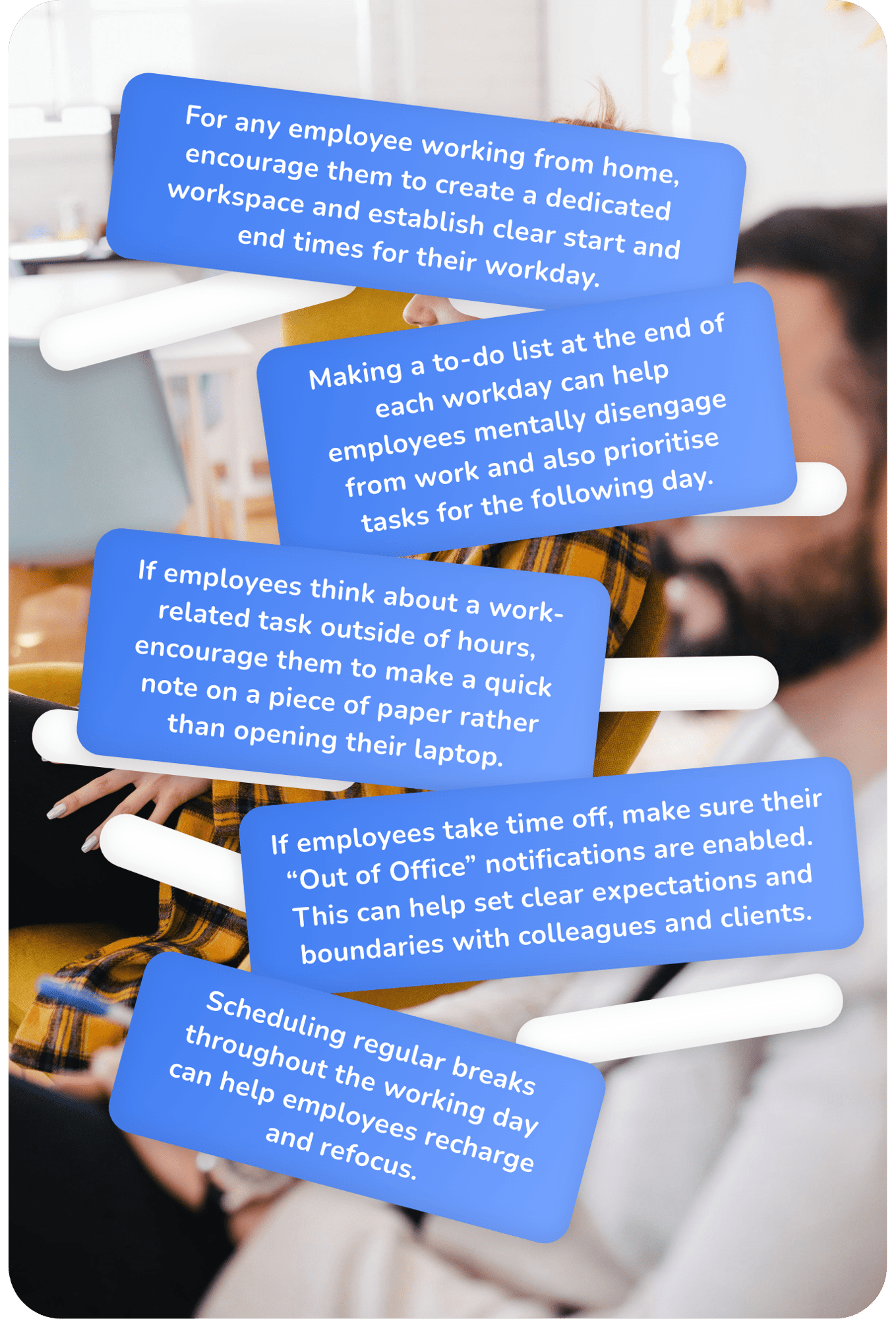It’s estimated that 1 in 4 people suffer from issues with their mental health every year. When people are suffering with their mental wellness, it can impact not only their personal lives - but also how they engage and perform at work.
In this guide, we’ll examine the concept of workplace wellbeing, the silent struggles many employees face with their mental health & the strategies you can implement to support them.
Workplace wellbeing is an umbrella term that refers to the mental, emotional, and physical health of your employees.
When you embrace the concept of workplace wellbeing, you recognize that employee health can be heavily influenced by factors like stress levels at work, job satisfaction, and work-life balance - and take positive steps to improve things.
So, why should you care about workplace wellbeing?
The answer is quite simple - it has significant benefits for both your employees and your business. When employees are physically, mentally, and emotionally healthy, they are happier, more focused, and more likely to be productive at work. Additionally, when employees feel supported and cared for by you as their employer, they are more likely to reciprocate this with higher levels of loyalty and commitment.
By prioritising employee well-being, you can also attract the best talent when recruiting. Jobseekers are increasingly looking for companies that offer wellbeing programmes and mental health support, including access to online mental health services.

A lot of people struggle silently with their mental wellbeing, with a recent study by Mind finding that 64% of people put on a brave face to avoid talking about mental health.
Employees might seem full of smiles and positivity when you engage with them in the office - but behind the facade, they might be facing anxiety, depression, or other challenges that directly impact their wellbeing and performance at work.
Everyone has their own reasons for choosing to stay silent about their mental wellbeing, but many employees worry that opening up about their mental health struggles could impact their job security, affect their career progression, or lead to judgement from colleagues and management.
However, if employees don’t get the right support when they need it, their mental health issues are likely to become more serious - impacting their overall health and potentially leading to circumstances that require them to take time away from work.
To address this challenge and create an environment where employees feel comfortable talking about their mental health, it’s important for your business to create a culture of empathy and understanding - and take proactive steps to support employee wellbeing.
Strategies you might consider include updating and clearly communicating your mental health policies across the business, providing access to resources such as employee mental wellness apps, and helping employees effectively manage their work-life balance.

Taking the work laptop home, accessing work email on phones, engaging in work WhatsApp groups in the evening - it’s easy to see how the lines between work and personal life can become blurred. But when work starts to take over your employee’s lives, it can lead to feelings of stress, anxiety, and burnout.
By helping your employees strike the right balance between work and their life outside the office - you can significantly boost their overall happiness, job satisfaction, efficiency and overall work performance. However, you can’t manage anybody’s work-life balance for them. It’s the responsibility of each individual employee to manage their own time and priorities, and find a balance that works for them.
So, how can you support and empower your employees to achieve the right work-life balance? First of all, consider offering flexible working arrangements. By allowing your employees to adjust their working hours around their personal commitments, you give them more control over their time and working conditions.
You might also consider discouraging all employees across the business from sending emails outside of working hours and making it clear that nobody is expected to respond to messages when they aren’t at work.

As part of helping employees manage their work-life balance and wellbeing, it’s also important to be aware of the impact that social media can have on their mental health. Social media has become an integral part of our daily lives, with most of us using platforms like Facebook, Instagram, and TikTok to connect with friends and engage with relevant content on a daily basis.
However, as social media usage continues to grow, so do concerns about its impact on our mental health. One of the biggest potential negative effects of social media is the way that it can present a distorted and overly positive view of people’s lives and achievements - potentially creating feelings of inadequacy. In a work context, employees might compare themselves to the carefully curated social media feeds of their colleagues. These comparisons can lead to an unhealthy sense of competition or feelings of jealousy and low self-esteem - none of which is good for healthy collaboration and teamwork within the office. Using social media platforms to communicate can also lead to a reduction in face-to-face interactions at work. This can weaken the strength of personal connections between colleagues and may even lead to feelings of isolation and disconnection.
As an employer, it’s important to take proactive steps to address social media’s potential negative impacts on the workplace. This might include establishing clear guidelines for social media use during work hours, promoting healthy digital habits, and even setting up certain periods of the day where employees are encouraged to put down their devices and engage with colleagues face-to-face.

As a business that cares about its employees, investing in employee wellbeing may just naturally feel like the right thing to do. But it also makes good business sense, with research from Deloitte actually suggesting that companies gain £5 for every £1 invested in their employee wellbeing programmes.
But how can you quantify the return on investment (ROI) from employee wellbeing initiatives?
While it may seem challenging to put a precise figure on the value of a happier, healthier workforce - there are several key metrics you can use to assess the impact of your wellbeing programs. One of the biggest areas where employee wellbeing can have a measurable business impact is in reducing absenteeism. When your employees are struggling with their wellbeing, they are more likely to take time off work, leading to reduced productivity & disruption for your business.
By providing support to help employees manage their health and wellbeing, you can reduce the number of absences due to ill health. Another important thing to measure is employee retention. When employees feel happy and engaged at work, they are more likely to stay with your business, reducing the costs of recruitment and training.

Throughout this guide, we’ve looked at the important role that employee wellbeing initiatives can play in protecting the health of your employees, and creating a productive, engaged, and resilient workforce that has a positive impact on your business.
But to deliver the best possible return from your employee wellbeing initiatives, you need to invest in the right online mental health services. At Thrive, we provide comprehensive online therapy and mental health support for your employees whenever they need it, for as long as they need it. Our app provides employees with access to a wide range of clinically proven tools, empowering them to proactively manage their mental health and build mental resilience.
From mood tracking and guided meditations to CBT exercises, Thrive offers a comprehensive toolkit for promoting mental wellbeing in the workplace. For employees who require additional support, our online therapy service connects employees with trained therapists for confidential 1-1 sessions via video, messaging, or voice calls.
With no lengthy wait times or complex referral processes, your team can access the expert support they need, when they need it most. Our online mental health support app is fully compliant with NHS digital standards and has been shown to deliver measurable improvements in employee workplace wellbeing.
To learn more about how Thrive’s online mental health services can support your business, contact our team today.
